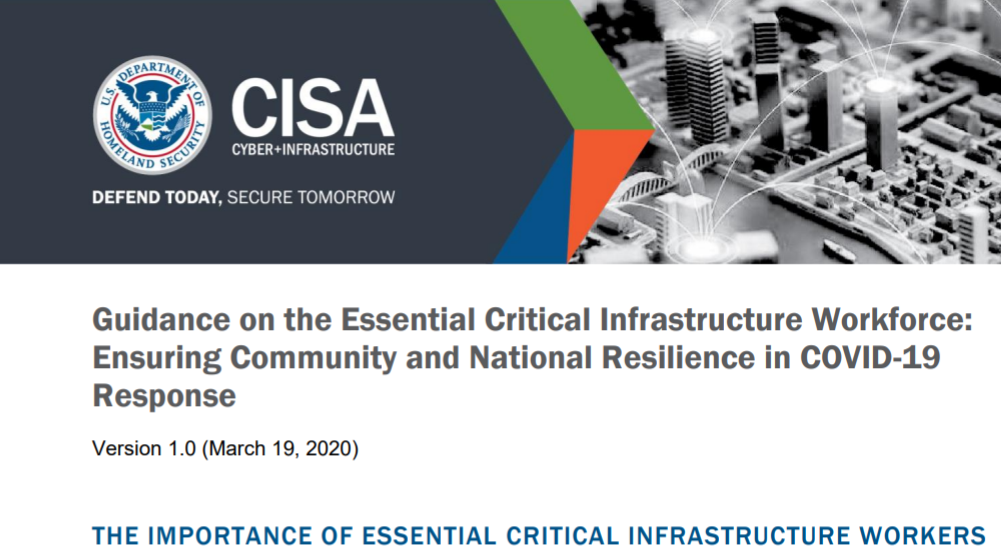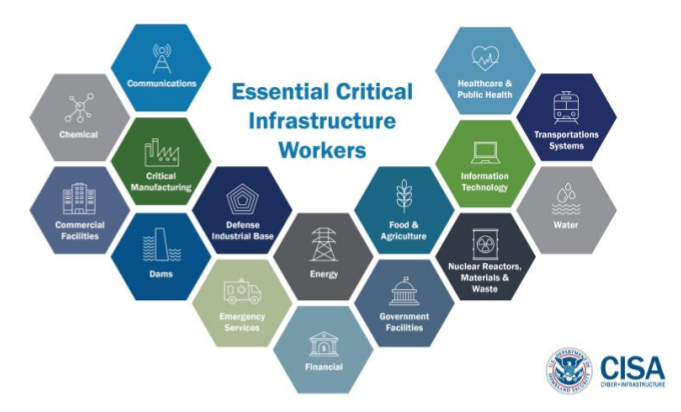Communications Workers Dubbed Essential Coronavirus Fighters by DHS
The smarter way to stay on top of the multichannel video marketplace. Sign up below.
You are now subscribed
Your newsletter sign-up was successful
No surprise here, but the Department of Homeland Security has issued guidance on the infrastructure industries and workers critical to fighting the coronavirus and the communications sector is prominently among them.

That guidance was prompted by the President's March 16 statement that “if you work in a critical infrastructure industry, as defined by the Department of Homeland Security, such as healthcare services and pharmaceutical and food supply, you have a special responsibility to maintain your normal work schedule.” DHS said that includes communications workers.
According to DHS' Cybersecurity & Infrastructure Security Agency (CISA), communications workers, including broadband, broadcast, cable and journalists, are "essential to continued critical infrastructure viability, including staffing operations centers, maintaining and repairing critical infrastructure, operating call centers, working construction, and performing management functions, among others."

The list is not a federal directive, but guidance to the state, local and tribal and territorial governments implementing response to the virus in their communities.
Here are the communications sectors and workers who made the list:
Communications:
- "Maintenance of communications infrastructure- including privately owned and maintained communication systems- supported by technicians, operators, call-centers, wireline and wireless providers, cable service providers, satellite operations, undersea cable landing stations, Internet Exchange Points, and manufacturers and distributors of communications equipment
- "Workers who support radio, television, and media service, including, but not limited to front line news reporters, studio, and technicians for newsgathering and reporting
- "Workers at Independent System Operators and Regional Transmission Organizations, and Network Operations staff, engineers and/or technicians to manage the network or operate facilities
- "Engineers, technicians and associated personnel responsible for infrastructure construction and restoration, including contractors for construction and engineering of fiber optic cables
- "Installation, maintenance and repair technicians that establish, support or repair service as needed
- "Central office personnel to maintain and operate central office, data centers, and other network office facilities
- "Customer service and support staff, including managed and professional services as well as remote providers of support to transitioning employees to set up and maintain home offices, who interface with customers to manage or support service environments and security issues, including payroll, billing, fraud, and troubleshooting
- "Dispatchers involved with service repair and restoration Information Technology:
- "Workers who support command centers, including, but not limited to Network Operations Command Center, Broadcast Operations Control Center and Security Operations Command Center
- "Data center operators, including system administrators, HVAC & electrical engineers, security personnel, IT managers, data transfer solutions engineers, software and hardware engineers, and database administrators
- "Client service centers, field engineers, and other technicians supporting critical infrastructure, as well as manufacturers and supply chain vendors that provide hardware and software, and information technology equipment (to include microelectronics and semiconductors) for critical infrastructure
- "Workers responding to cyber incidents involving critical infrastructure, including medical facilities, SLTT governments and federal facilities, energy and utilities, and banks and financial institutions, and other critical infrastructure categories and personnel
- "Workers supporting the provision of essential global, national and local infrastructure for computing services (incl. cloud computing services), business infrastructure, web-based services, and critical manufacturing
- "Workers supporting communications systems and information technology used by law enforcement, public safety, medical, energy and other critical industries
- "Support required for continuity of services, including janitorial/cleaning personnel."
"Workers across the information technology sector are playing a more essential role than ever in enabling critical infrastructure, helping businesses stay online, and keeping citizens connected," said John Miller, senior VP of policy for tech advocate ITI (the Information Technology Industry Council). "We commend CISA for quickly providing comprehensive guidance to define essential workers and appreciate their collaboration with industry stakeholders during the process. "We urge state and local officials to follow the federal government’s lead and reflect this key guidance in their jurisdictions."
The smarter way to stay on top of the multichannel video marketplace. Sign up below.
“The nation is relying on its communications infrastructure now more than ever," said Robert Mayer, SVP for cybersecurity and innovation at USTelecom and chair of the Communications Sector Coordinating Council. "Today, CISA took an important step to help maintain network preparedness, security and resiliency in the midst of the COVID-19 public health crisis."
“Here’s why this is important news," he said. "[T]he employees managing the health and security of our networks work in operations centers and need to reach their workplace to do their jobs. In addition, some functions can only be handled in-person, so communications providers must keep critical store locations open to service first responder equipment like routers or provide publicly accessible Wi-Fi.
“Today’s guidance means we can continue to serve all of our customers, protect our employees and maintain communications operations throughout this unprecedented national emergency.”
Contributing editor John Eggerton has been an editor and/or writer on media regulation, legislation and policy for over four decades, including covering the FCC, FTC, Congress, the major media trade associations, and the federal courts. In addition to Multichannel News and Broadcasting + Cable, his work has appeared in Radio World, TV Technology, TV Fax, This Week in Consumer Electronics, Variety and the Encyclopedia Britannica.

